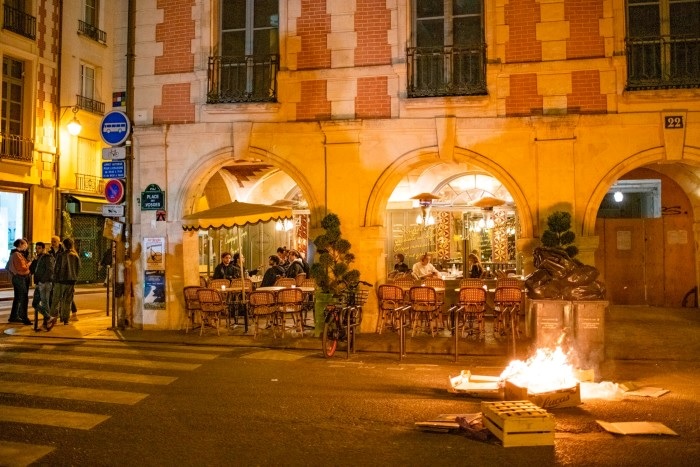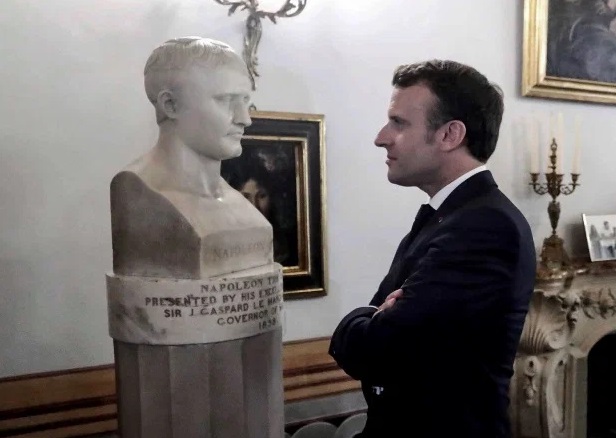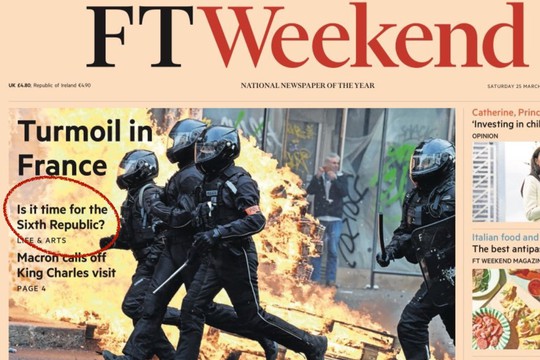France was in turmoil even before Emmanuel Macron’s unilateral decision last week to raise the minimum general retirement age from 62 to 64, after he couldn’t get it voted through parliament. French anger transcends pensions and Macron’s high-handedness, notes “The Financial Times”.
There’s a generalised, long-term rage against the state and its embodiment, the president. But Macron’s unpopular ramming through of a higher retirement age without a vote increases the risk that the French will follow Americans, Britons and Italians and vote populist: President Marine Le Pen in 2027. The far-right’s vote in presidential run-offs has gradually risen this century, to 41 per cent last year.
France can’t go on like this. It’s time to end the Fifth Republic, with its all-powerful presidency — the closest thing in the developed world to an elected dictator — and inaugurate a less autocratic Sixth Republic. Macron might just be the person to do it.
The Fifth Republic was declared in 1958, amid the chaos of the Algerian war and fears of a military coup. The constitution was written for and partly by Charles de Gaulle, the 6ft 5in tall war hero, the “man of providence” whose very name made him the embodiment of ancient France. So the constitution created a strong executive, albeit not centred on the president.
The Fifth Republic’s governing philosophy became a sort of French-Confucian rule by the cleverest boys in the class, plucked from all ranks of the population.
The deal became that the French would hand over a big chunk of their income to the state, and navigate an often nightmarish bureaucracy, in exchange for free education, healthcare, pensions and often even subsidised holidays.
Into the 1990s, the system more or less worked. France experienced its “Trente Glorieuses” — 30 glorious years of economic growth, from 1945 until 1975. The moment when the Fifth Republic lost its sheen was possibly the oil shock of 1973, since when the economy has mostly stagnated.
The disenchantment with the president showed in approval ratings. Mitterrand (president from 1981 to 1995) and Chirac (1995-2007) generally had ratings between 40 and 60 per cent, according to pollsters Kantar Sofres. But the last three presidents, Nicolas Sarkozy, François Hollande and Macron, have usually ranged between 20 and 40 per cent. Hollande’s rating in one poll hit 4 per cent (not a typo).
In 60 years, the French president has gone from ‘man of providence’ to ‘not the devil’.
 France is France – patrons at a café on Place des Vosges ignore burning debris
France is France – patrons at a café on Place des Vosges ignore burning debris
Photo FT
When things go wrong, the French blame the technocrats — and above all the president, who decides without consulting them. Ordinary people’s lives feel determined, down to the day they can retire, by a Parisian pretend meritocracy from which they were excluded at birth. Three-quarters of people who identify as belonging to “popular classes” say they feel the object of social contempt and lack of recognition, reports Luc Rouban, an expert on politics at Sciences Po, an elite Paris university. This is particularly galling, given the country’s promise, proclaimed from the facades of every post office and primary school: “Liberté, égalité, fraternité”. France isn’t the UK or US, where the power of social class or money is frank.
Since Macron became president in 2017, popular anger has targeted him.
 Macron and Napoleon
Macron and Napoleon
The fruits of the Fifth Republic aren’t so bad. But the system itself has gone out of date, says Catherine Fieschi, founder of the think-tank Counterpoint. The state’s autocratic nature helps explain why the French are so angry despite living relatively well. You could describe the republic’s workings without mentioning the almost irrelevant parliament. France today has three branches of government: the presidency, the judiciary and the street. If the president decides to do something, only the street can stop him — by stopping the country through protests and strikes.
Street and president rarely seek compromise. One wins, one loses, writes FT with all the sarcasm that Englishmen feel towards the French.
Paris streets today:

read more in our Telegram-channel https://t.me/The_International_Affairs

 11:17 27.03.2023 •
11:17 27.03.2023 •























